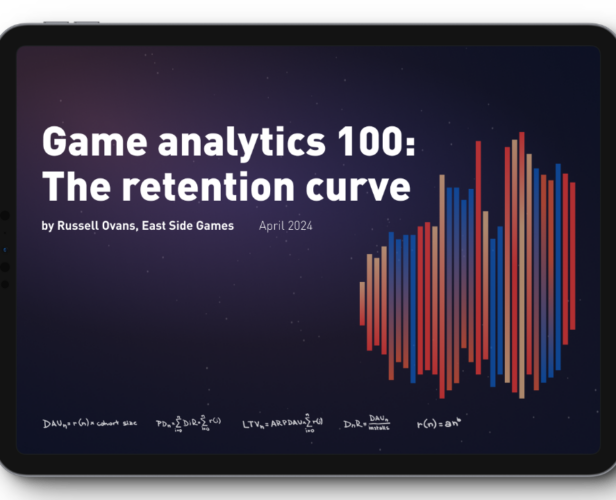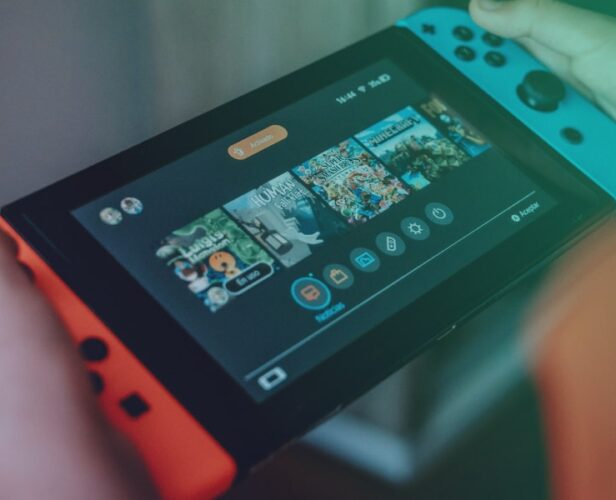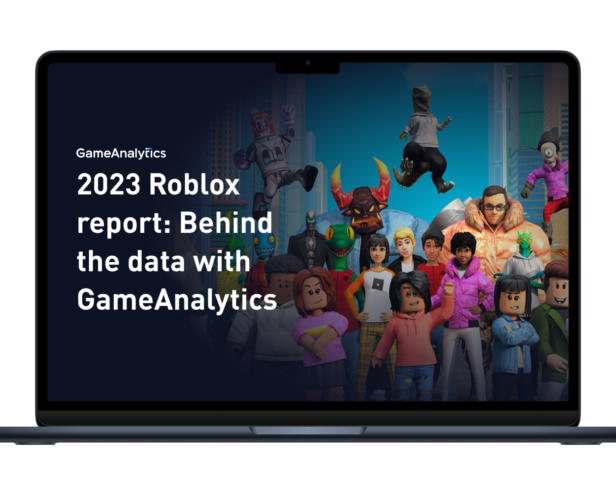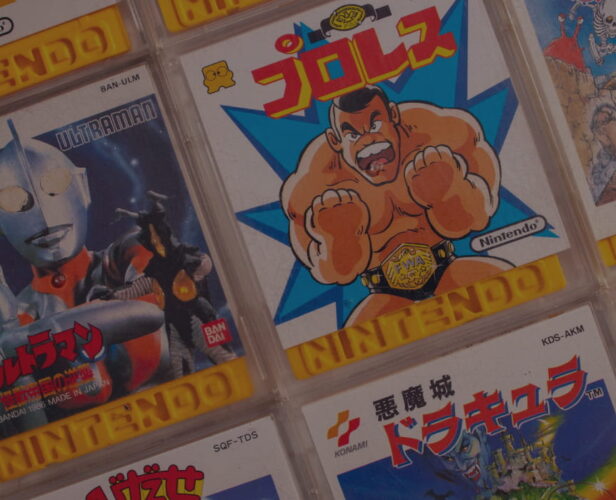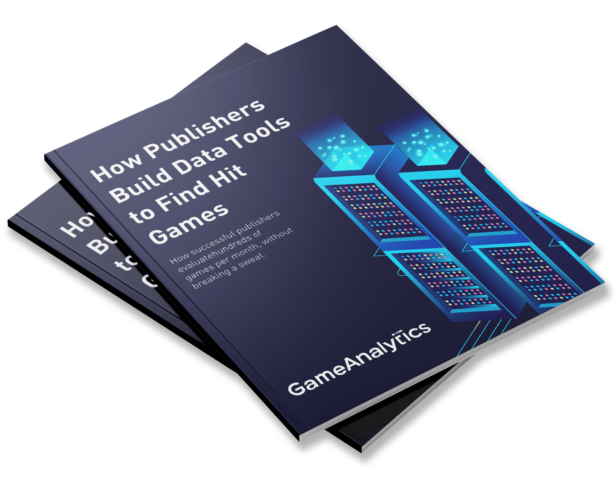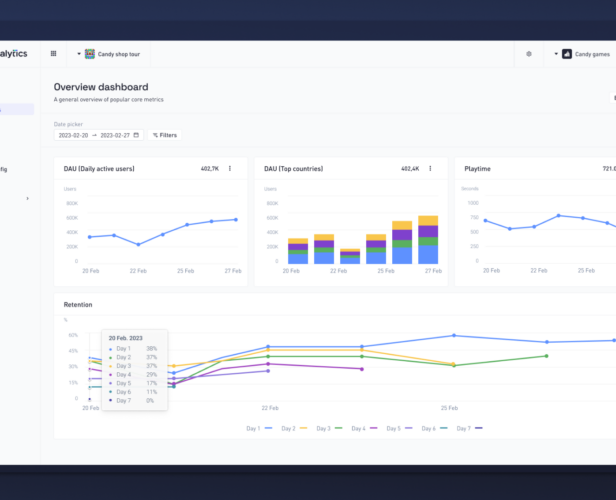Resources > All
Insights and tips about the games industry
Subscribe for gaming insights, industry reports and product updates delivered straight to your inbox.
#AI
How to use AI to improve your in-game voice-overs
AI can help your studio in many ways; from coming up with ideas, writing placeholder scripts, and even helping market your game. So, where is the technology when it comes to voice-overs? Does it actually work? And how can you use it?
Game analytics 100: The retention curve
Retaining customers is paramount for game studios, as acquiring new customers involves significant costs. In “Game Analytics 100: The Retention Curve,” Russell Ovans from East Side Games delves into the critical aspect of customer retention in the gaming industry. What will you learn? Importance of retention: Customer retention is crucial for game studios, as acquiring new customers is expensive compared to retaining existing ones. Day-n retention: Measures the proportion of players returning to play a game n days after installation, providing insights into player engagement. Retention curve: Generalizes day-n retention by predicting player retention for any day after installation, derived from historical data. Key metrics: Includes day-n retention, average player duration, and lifetime value (LTV) to assess and optimize game performance. Tools: Utilizes statistical regression and data analysis tools like Excel and Tableau to analyze retention data and predict player...
#Game Design
Game design tropes that don’t translate to VR
What are the top game design conventions that don’t currently translate well to VR? And what can you do to overcome these? Let’s break it down.
#Tool & Product
Boost player satisfaction with enhanced health monitoring features
NOTE: Certain platforms send error events automatically if enabled, while others require manual sending. To start sending events for FPS, Boot time, and Memory, it is required to upgrade your SDK to Unity 7.8.0 or newer. Every game developer strives to deliver a seamless and optimized gaming experience. To support your efforts, we expanded the capabilities of Health reporting, introducing FPS (frames per second), Memory Usage management, and App Boot Time features. Complementing existing error messages and related charts, our health reporting toolset allows developers to delve deeper into their game’s performance metrics, identify areas for improvement, and ultimately enhance player satisfaction. Our health feature offers robust filtering capabilities, enabling developers to dissect performance metrics by country, build, and device. Such a granular level of analysis empowers developers to identify performance inconsistencies across different platforms and tailor optimizations accordingly. At...
#Game Design
Will people play AAA games on mobile?
AAA games are coming to mobile. But will people actually play AAA games on smaller devices? Here’s what we know.
#Game Design
Why you should port your mobile game to console or PC
Developing a version of your game for PC or console can help boost sales and reach more players. But is it right for your game?
#Tool & Product
Running custom analysis in real time with Raw Export
If you want to optimize your games, improve user experience, and enhance monetization, insights are everything. Understanding player behavior, trends, and preferences can make or break a game’s success. That’s where GameAnalytics’ Raw Export comes in—an innovative feature allowing you to automate the export of your games’ data in its raw JSON format and transfer it in real time. Raw Export was developed with one goal in mind: to empower developers with a need to perform custom analytics. By providing immediate access to raw data, we enable developers to build internal tools without the need for extensive research and development time or infrastructure costs. Developers can, therefore, focus solely on extracting insights and driving their games’ success. Automate your data flow with Raw Export Raw Export is a cutting-edge service that automatically extracts and transfers your game’s raw data to...
2023 Roblox report: Behind the data with GameAnalytics
Download a comprehensive report of Roblox player behavior and game performance based on GameAnalytics data from 2023. This report highlights critical benchmarks and insights to help Roblox creators optimize their games. What’s inside? Devices analysis Players’ daily session frequency Average revenue spent per user Session length and count benchmarks Retention benchmarks Revenue benchmarks
#Ads & Monetization
Creative ways to make your hybrid-casual game more profitable
In-app purchases and advertising aren’t the only ways to generate revenue for your hybrid-casual game. Let’s explore some alternatives.
#Data & Analytics
Boosting mobile game performance with store ranking insights
Securing a coveted spot in the top charts can be a game-changer for developers. It opens doors to increased downloads, revenue, player engagement, and long-term success in the competitive mobile gaming world. To help you navigate the complexities of app stores, we developed the Store Intelligence platform. Store rankings are not just empty metrics; they provide valuable insights into player preferences, market trends, and the factors that drive a game’s success. Access to such metrics is especially important for developers and studios aspiring to get to the top, who do not have the resources for expensive data solutions and data scientists to help them translate acquired data into actionable insights. Together with our Benchmarks, Store Intelligence presents a tangible opportunity to understand your competitors’ strategies and how they turn them into engaging gameplay mechanics, monetization strategies, and more. The biggest...
#Data & Analytics
Leveraging game industry benchmarks to scale your games
Achieving success when creating a game requires more than creativity and innovation. Knowing and correctly interpreting your KPIs is undoubtedly the foundation of making educated decisions during game development. And to support you on your data journey, we compiled a list of the 22 most essential metrics to keep an eye on. But while paying attention to your game performance cannot be overstated, it is equally important to deeply understand player preferences and industry standards. From performance comparison to trend identification, game industry benchmarks offer a grand scale to set realistic goals and expectations. Providing data and insights from over 140,000 game studios and developers, our Benchmarks are a powerful ally for game developers. The tool offers a wealth of information on key metrics such as retention, monetization, engagement, and advertising, enabling developers to understand player behavior and market trends...
#Data & Analytics
22 metrics all game developers should know by heart
When it comes to game and mobile app analytics, there are hundreds of metrics numbers to track. There are metrics like downloads, sessions, or DAUs on one end of the spectrum. These numbers are relatively straightforward and measure concrete actions. More complicated metrics include user churn or Average Revenue Per Paying User (ARPPU). These are less intuitive to interpret and might raise more questions than answers. While there’s no one-size-fits-all policy for game analytics, some useful metrics can help shed light on how you can improve your mobile game. To better understand how these metrics relate to each other and provide comprehensive insights into your game’s performance, we divide them into three main categories: engagement metrics, monetization metrics, and advertising metrics. Each category focuses on different aspects of player behavior, revenue generation, and marketing effectiveness, allowing you to optimize various...
#Strategies
Navigating the World of Matchmaking: Tips for Game Developers
When building a multiplayer game, your players are going to need a way to find each other. That's where a matchmaker comes in. But what is a matchmaker? How do they work? And is there any difference when it comes to mobile?
#Editor's pick
2023 Roblox report: Behind the data with GameAnalytics
Download a comprehensive report of Roblox player behavior and game performance based on GameAnalytics data from 2023. This report highlights critical benchmarks and insights to help Roblox creators optimize their games. What’s inside? Devices analysis Players’ daily session frequency Average revenue spent per user Session length and count benchmarks Retention benchmarks Revenue benchmarks
#Editor's pick
The Game Developer’s Handbook to Mastering Data Solutions
Data is the key to success in the ever-evolving landscape of game development. Explore this guide to transform your data into insights using our turn-key data solutions. What’s inside? Our comprehensive guide explores cost-saving strategies and real-world applications for advanced use cases. Learn how to seamlessly integrate data sources, unlock detailed player insights with Player Warehouse, access real-time data with Raw Export, and ensure data privacy compliance.
#Case study
Developing a #1 VR MMO: Ramen VR’s Journey with GameAnalytics
Discover how Ramen VR used data-driven game development to launch "Zenith: The Last City", which became the #1 bestselling game all major VR platforms—including Meta Quest/Rift, Steam and PlayStation VR.
#Editor's pick
Using AI to Supercharge Your Game Art Design
Discover how tweaking AI tool settings can help you generate varied art styles, produce better concepts, and speed up the process from prototype to final design. With AI on your team, creating unique game art has never been easier or faster.
#Editor's pick
Event Design & Tracking Guide for GameAnalytics
Learn how to create an adaptable tracking plan, enabling you to unlock richer insights and maximize the value of your data within GameAnalytics.
#Editor's pick
From Zero to Hero: Tracking Key Success Pillars in Gaming
Our COO, Allison, recently joined Mobvista for the first episode of their "From Zero to Hero" video series. Watch the video today for a detailed overview into tracking three essential pillars of gaming success: Acquisition, Engagement, and Monetization.
#Editor's pick
How studios use DataSuite to find hit games
Learn how successful publishers evaluate hundreds of games per month, to find the next hit game.
#Editor's pick
Among Us VR dev talks about how to create immersive worlds
VR is all about immersion. It’s about allowing players to lose themselves in more than just a game, but a new world. You have to build VR experiences the right way to make this happen. This goal is always top-of-mind for Schell Games. In this interview, we spoke to Schell Games’ Vice President of Product, Charlie Amis, to learn their story. “For VR, you want to make the player feel like they’re actually in the world you’ve created. This isn’t as true or a high priority in PC and console games. If people start to lose that sense of presence and immersion, then a lot of the reason they put the headset on is hurt. They want to go to another world or be someone new. So you need to help them feel like they’re really there and really that...
#Editor's pick
GameAnalytics H1 Update: New Product Improvements!
It’s been a busy time since February, when the largest update in GameAnalytics history was launched. Read on for more information about what’s changed recently, and new functionality coming to the platform very soon.
#Case study
How TapNation uses DataSuite to increase the LTV of 19 hit games by 50% in only 6 months
Smashing obstacles with Giant Rush While they’ve seen huge improvements using DataSuite across their portfolio, one game stands out in particular: Giant Rush. (And not just because the character is huge.) The title has now reached over 140 million downloads. And, through a series of A/B tests and insights from the data they collected, they’ve been able to increase the LTV by a whopping 200% over six months for this specific title. “It’s because we A/B test every day,” Philippe Grazina from TapNation says. “We ask questions like: When are players leaving the game? For example, the boss in Giant Rush. If we spot that they’re leaving at the same point every time, we know we need to make a change. Small details like that really help.” Through these granular insights, TapNation can iterate and improve on their game step...
#Editor's pick
How to Build a Data Warehouse for Games from Scratch
Over our last couple of blogs around data warehouses, we’ve explained how they let you analyze data from across your portfolio and look at what insights you can gather from them. Now, we’ll dive into how to build a data warehouse. What steps do you need to take and what resources will you need? To figure this out, we’ve rounded up the costs, steps, and tools we think you’ll need to get started. Please note, that we haven’t included the cost of running an engineering department (which you’ll need), which can end up being a lot of $$$. What do I need to get started? Before you start, you’ll need to ensure you have the right people. You’ll likely need a software or data engineer, and perhaps an architect or DevOps engineer. You’ll also need to budget for tools like...


